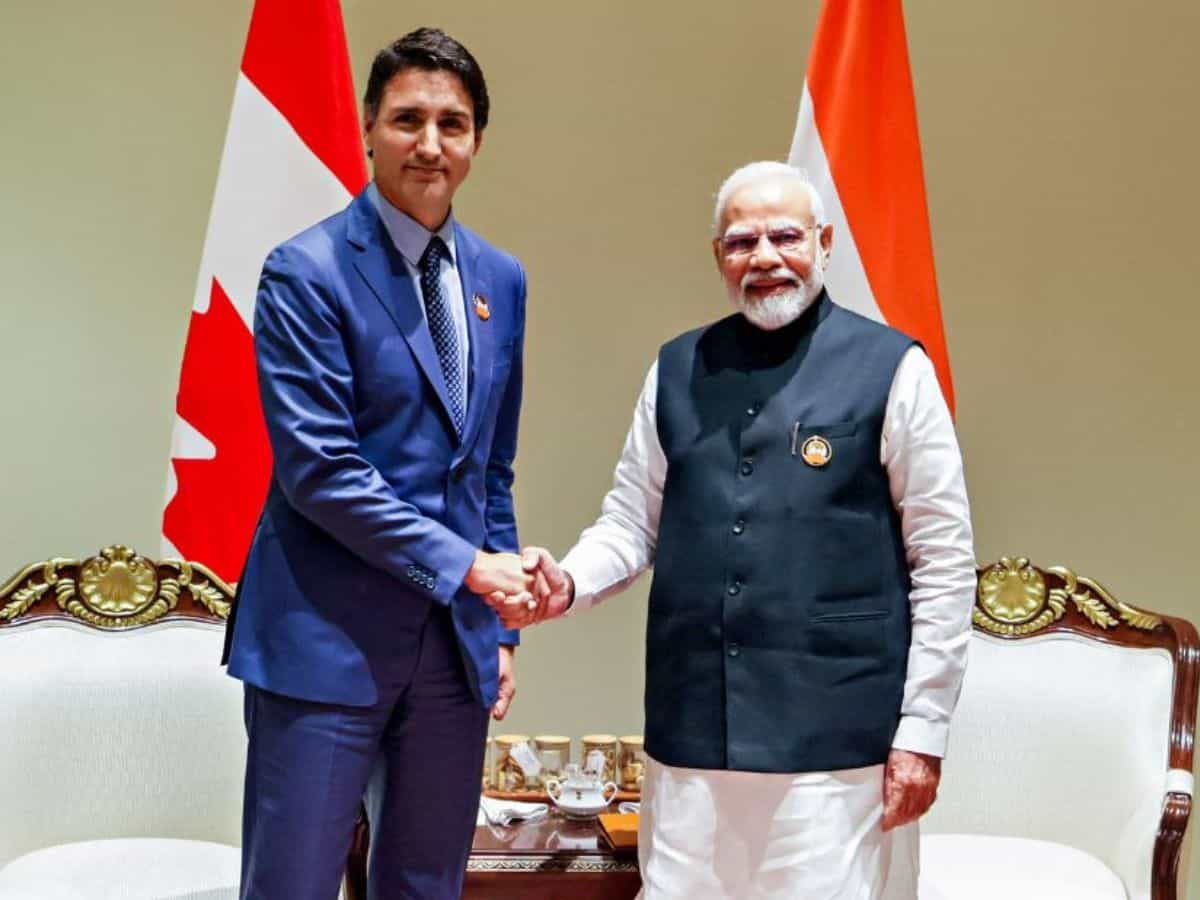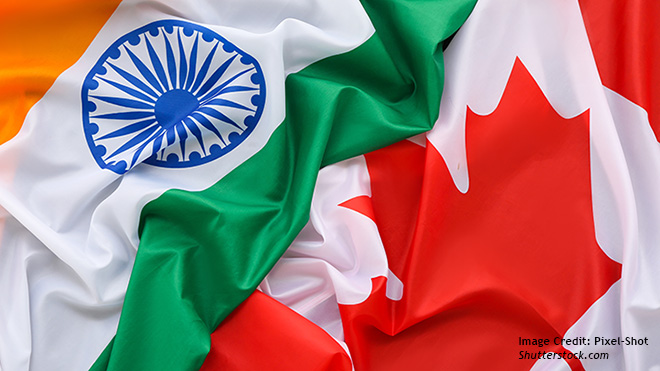Michael Kugelman Draws Parallel Between India-Canada Relationship and Longstanding Tensions with Pakistan
The recent diplomatic fallout between India-Canada has drawn stark comparisons to India’s long-standing, tense relationship with Pakistan. The escalating tensions have now caught the attention of international observers, including Michael Kugelman, a respected U.S.-based foreign policy expert and Director of the South Asia Institute at the Wilson Center. In a detailed analysis, Kugelman likened the India-Canada situation to the Indo-Pakistani relationship, a comparison that underscores just how dire the situation between the two nations has become.

For years, India-Canada have enjoyed relatively cordial relations, but that changed dramatically following accusations made by Canadian Prime Minister Justin Trudeau in 2023. During a parliamentary session, Trudeau claimed to have “credible allegations” that India was involved in the killing of Hardeep Singh Nijjar, a known Khalistani terrorist, who was gunned down in Surrey, British Columbia, in June 2023. India, however, had designated Nijjar a terrorist in 2020, and his death sparked a diplomatic war of words between the two nations.
India’s response to Trudeau’s allegations was swift and unequivocal. The Indian government labeled the accusations as “absurd” and “motivated.” India also accused Canada of harboring anti-India extremists, a charge it has historically levied against Pakistan. This accusation, according to Kugelman, is central to why the relationship between India and Canada has now reached the same low point as India’s historically hostile relationship with Pakistan.

Kugelman remarked, “This is a relationship that’s now hit rock bottom… The situation is reminiscent of India’s relations with Pakistan, particularly with the expulsion of senior diplomats and the use of blistering language in government statements. India’s accusation that Canada is sheltering anti-India terrorists is something that we’re used to hearing India say about Pakistan.”
The current standoff between India-Canada has seen tit-for-tat expulsions of diplomats, a hallmark of the strained Indo-Pakistani dynamic. Recently, India expelled six Canadian diplomats after Canada had previously expelled six Indian diplomats, reportedly due to their alleged involvement in a “campaign of violence,” according to Canadian sources. These dramatic moves have drawn global attention to the deteriorating relationship between the two countries.
Kugelman highlighted the increasingly inflammatory rhetoric coming from both sides, which is eerily similar to the language used during diplomatic spats between India and Pakistan. He noted that the core of India’s allegations against Canada—harboring extremists and terrorists—is precisely the language India has used in its decades-long confrontation with Pakistan.
This escalation has significant consequences. India-Canada relations are now characterized by deep mistrust, accusations of interference in internal affairs, and high-stakes diplomatic maneuvers that threaten to unravel what was once a more stable partnership. The events have reverberated not only in the political corridors of New Delhi and Ottawa but across the international community, raising concerns about the future of diplomacy between two significant players on the global stage.

One of the contributing factors to the growing rift between India and Canada, as pointed out by Kugelman, is Canadian Prime Minister Justin Trudeau’s stance on India’s internal matters. In particular, Trudeau’s vocal support for the farmers’ protests in India during 2020 and 2021 against the controversial agricultural laws was viewed by New Delhi as interference in its domestic affairs.
The diplomatic relationship between India-Canada has deteriorated significantly in recent months, reaching a low point reminiscent of India’s historically strained ties with Pakistan. The tensions escalated after Canadian Prime Minister Justin Trudeau accused India of being involved in the assassination of Khalistani terrorist Hardeep Singh Nijjar, allegations that India vehemently denies. This has led to a tit-for-tat expulsion of diplomats and a war of words between the two nations, with India accusing Canada of harboring anti-India extremists. The ongoing rift, fueled by political and ideological differences, particularly over issues such as Trudeau’s support for India’s farmers’ protests, has resulted in a deep sense of mistrust, making the future of diplomatic relations between the two countries uncertain.
“It is notable that PM Justin Trudeau has made some comments on internal developments in India that one would not expect a Canadian PM to make, such as expressing support for farmers protesting against Indian agricultural laws,” Kugelman said. This marked a turning point in relations between the two countries. Trudeau’s comments were seen as an unnecessary intrusion into India’s domestic policies, and the perception in New Delhi is that these statements have emboldened anti-India elements in Canada.
Kugelman pointed out that Trudeau’s domestic political landscape may also be driving the strained relationship. In Canada, there is a significant Sikh diaspora, some of whom hold pro-Khalistan views. The Canadian government’s perceived leniency towards these groups has long irked India, which sees Khalistani separatism as a threat to its sovereignty and security. Trudeau’s political calculations, particularly his need to cater to the Sikh vote in Canada, have, according to many in India, contributed to the widening rift.
India-Canada relations have severely deteriorated amid allegations of extremist support and diplomatic expulsions, drawing comparisons to India’s strained ties with Pakistan. Tensions between India-Canada have escalated rapidly, with diplomatic ties hitting a new low following allegations and mutual expulsions of diplomats. India-Canada’s relationship has plunged into a deep crisis, marked by accusations of extremism and the expulsion of diplomats on both sides.
While Canada denies that it harbors extremists or terrorists, Kugelman emphasized that this disagreement is at the heart of the ongoing diplomatic breakdown. India remains firm in its position that Canada has allowed extremist elements to thrive, further fueling mistrust between the two nations. “This government in Canada has taken a series of decisions that include expressing support for Sikhs in India, in terms of the farmers’ movement, and this has been a source of great frustration in New Delhi,” Kugelman explained.
Indeed, India’s frustration with Trudeau’s government is palpable. In a hard-hitting statement, India accused Trudeau of providing space to violent extremists and terrorists “to harass, threaten, and intimidate Indian diplomats and community leaders in Canada.” This statement marked a significant escalation in the language used by Indian officials, signaling just how deep the divisions have become.
In addition to the allegations about Nijjar’s assassination, the expulsion of diplomats, and the accusations of harboring extremists, there is a broader sense of disillusionment within India-Canada relationship. Once seen as a partner with shared democratic values, Canada is now viewed with suspicion, and bilateral relations are likely to remain strained for the foreseeable future.
The crisis in India-Canada relations has now reached a point where repair seems difficult, if not impossible, in the near term. As Michael Kugelman observed, the situation is eerily similar to the long-standing tensions between India and Pakistan. The accusations, expulsions, and strained rhetoric have all the hallmarks of a relationship that has hit rock bottom.
For now, neither side appears willing to back down. India remains steadfast in its belief that Canada is harboring anti-India extremists, while Canada continues to reject these accusations, which jeopardizes India-Canada’s future. With both nations entrenched in their positions, the diplomatic freeze between India and Canada may endure, much like India’s fraught relationship with Pakistan.
In the larger context, this deterioration of ties signals a significant shift in global diplomacy. What was once a cooperative relationship has now devolved into a diplomatic crisis, with both nations standing on opposite sides of a widening chasm. The future of India-Canada relations remains uncertain, and as the standoff continues, the potential for further escalation looms large.

